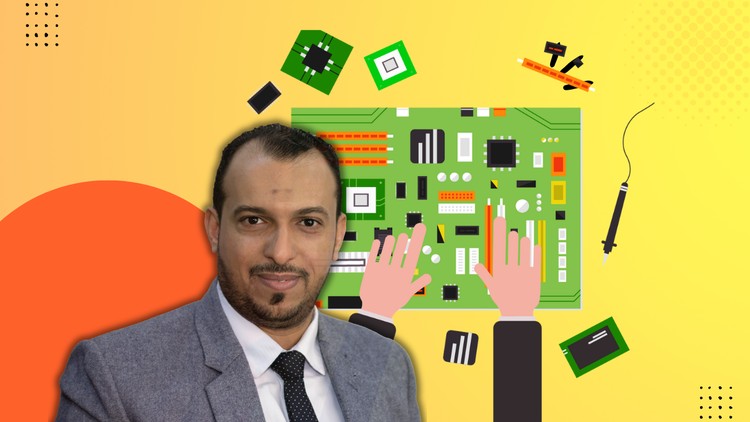
Your First Step in Your Electronics Journey
What you will learn
Students will be able to grasp key concepts such as voltage, current, resistance, and Ohm’s Law, which are fundamental to working with electronics.
Students will learn about and be able to identify essential electronic components, including resistors, capacitors, diodes, transistors, and SMD components
Students will become familiar with essential electronics tools such as multimeters, oscilloscopes, and power supplies to build and troubleshoot circuits.
Students will be able to design and assemble simple circuits using breadboards, applying knowledge of components, and tools in practical scenarios.
Why take this course?
Are you curious about how electronic devices work? Do you want to build your own circuits or start creating smart devices? Whether you’re a complete beginner or have some basic knowledge, this course will guide you through the exciting world of electronics engineering.
In this hands-on and beginner-friendly course, you’ll learn the fundamental concepts that form the foundation of electronics. We’ll break down complex topics like voltage, current, and resistance, and you’ll get a solid understanding of essential components such as resistors, capacitors, diodes, and transistors.
Here’s what you’ll gain from the course:
- Understand Key Electrical Concepts: voltage, current, resistance, and Ohm’s Law .
- Work with Essential Components: Learn the functions and practical applications of resistors, capacitors, transistors, and more.
- Master Common Tools: Become able to use a multimeter, oscilloscope, and soldering iron to build and troubleshoot circuits.
- Prototype Circuits: Design and assemble working circuits on a breadboard and experiment with different configurations.
- Explore Microcontrollers: Get hands-on with Arduino , and learn how to program them to control electronic components.
- Understand SMD Components: Explore Surface-Mount Devices (SMD) and their importance in modern electronics.
Throughout the course, you’ll engage in practical, real-world projects, building your skills step by step. Each lesson is designed to be clear, concise, and easy to follow, with plenty of examples to help you grasp the material.
By the end of the course, you’ll have the confidence to design, prototype, and troubleshoot your own circuits, making this the perfect starting point for anyone interested in DIY electronics, IoT, or even pursuing a career in electronics engineering.
No prior experience required—just a passion for learning and a willingness to get hands-on!